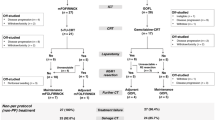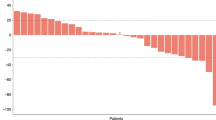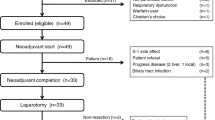Abstract
Carcinomas of the exocrine pancreas respond poorly to most chemotherapy regimens. Recently continuous infusional 5-fluorouracil (200 mg m-(2)day-1) with 3 weekly cisplatin (60 mg m-2) and epirubicin (50 mg m-2) (the ECF regimen) has proven to be an active regimen in gastric and breast cancer and consequently worthy of further study in pancreatic cancer. Thirty-five patients were treated with the ECF regimen as above, of whom 29 were evaluable for response and 32 were evaluable for toxicity. The mean age was 59 years (range 37-75). Sixteen patients had locally advanced disease at presentation and 19 had metastases. Objective tumour responses were documented in five (17.3%) patients who achieved a partial response; in 18 (62%) patients there were no change and six (20.7%) patients progressed on therapy. Patients with either stable disease or partial response had a significantly improved overall survival (median = 253 days) compared with patients who progressed (median = 170 days; P = 0.01). Grade 3/4 (WHO) toxicity (all cycles) included alopecia in 18 (56%) patients, nausea/vomiting in eight (25%) stomatitis in three (9%) and diarrhoea in seven (22%) patients, with rhinorrhoea and excessive lacrimation in one patient each. Neutropenic sepsis occurred in 13 cycles in ten patients, and there was one toxic death due to sepsis. There were eight other episodes of non-neutropenic sepsis requiring hospital admission. Fourteen patients (40%) experienced complications with their Hickman lines, including thrombotic episodes (six patients) or their line falling out (five patients). ECF can prolong survival in patients with locally advanced or metastatic pancreatic cancer who demonstrate a response or stabilisation of their disease. However, this is associated with considerable toxicity.
This is a preview of subscription content, access via your institution
Access options
Subscribe to this journal
Receive 24 print issues and online access
$259.00 per year
only $10.79 per issue
Buy this article
- Purchase on Springer Link
- Instant access to full article PDF
Prices may be subject to local taxes which are calculated during checkout
Similar content being viewed by others
Author information
Authors and Affiliations
Rights and permissions
About this article
Cite this article
Evans, T., Lofts, F., Mansi, J. et al. A phase II study of continuous-infusion 5-fluorouracil with cisplatin and epirubicin in inoperable pancreatic cancer. Br J Cancer 73, 1260–1264 (1996). https://doi.org/10.1038/bjc.1996.241
Issue Date:
DOI: https://doi.org/10.1038/bjc.1996.241
This article is cited by
-
Two phase I studies of concurrent radiation therapy with continuous-infusion 5-fluorouracil plus epirubicin, and either cisplatin or irinotecan for locally advanced upper gastrointestinal adenocarcinomas
Cancer Chemotherapy and Pharmacology (2011)
-
Phase II study of short-time oxaliplatin, capecitabine and epirubicin (EXE) as first-line therapy in patients with non-resectable gastric cancer
British Journal of Cancer (2008)
-
Comparison of Intrahepatic and Pancreatic Perfusion on Fusion Images Using a Combined SPECT/CT System and Assessment of Efficacy of Combined Continuous Arterial Infusion and Systemic Chemotherapy in Advanced Pancreatic Carcinoma
CardioVascular and Interventional Radiology (2007)
-
Fixed dose-rate infusion of gemcitabine in combination with cisplatin and UFT in advanced carcinoma of the pancreas
Cancer Chemotherapy and Pharmacology (2006)
-
Implantation of central venous ports with catheter insertion via the right internal jugular vein in oncology patients—single center experience
Supportive Care in Cancer (2006)



